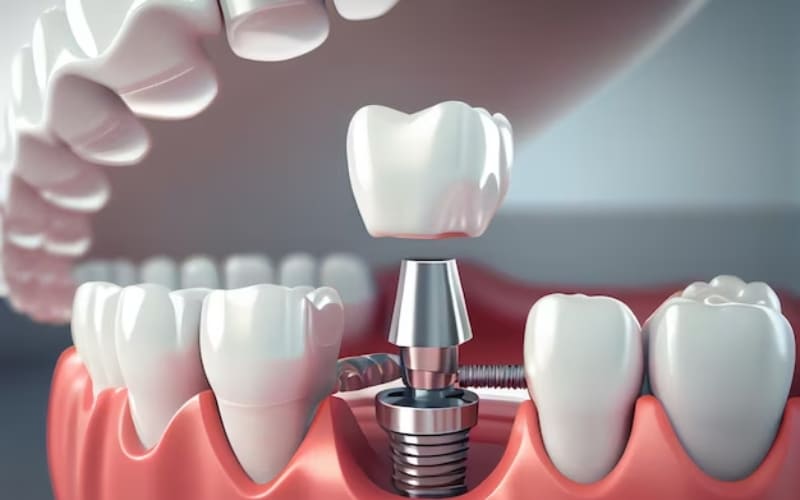
Dental implants have become increasingly popular and effective in restoring missing teeth. While they offer numerous benefits, it is important to consider the potential downsides. In this blog post, we will delve into the possible complications, factors influencing suitability, and the importance of precautions and aftercare.
By understanding the advantages and potential drawbacks of dentures, you can make an informed decision about this tooth replacement option.
Benefits Of Dental Implants
1. Improved appearance and self-confidence:
Dental implants mimic natural teeth, filling gaps left by missing teeth, enhancing smiles, self-confidence, and overall appearance, and providing a complete and beautiful smile.
2. Enhanced oral health and speech:
Dentures offer stability, support, and bite integrity while stimulating the jawbone to prevent bone loss and preserve facial structure.
3. Increased comfort and convenience:
Dental implants are permanently fixed in the mouth, eliminating the need for messy adhesives and allowing for easy enjoyment of favorite foods without discomfort or restrictions.
4. Long-term durability and reliability:
Dentures made from high-quality materials like titanium offer long-lasting durability with proper care and maintenance, ensuring stability and reliability in the long run.
Dentures provide aesthetic and functional benefits, enhancing self-esteem, oral health, and overall quality of life by improving overall oral health.
The Success Rate Of Dental Implants
1. Statistics on high success rates:
Dental implants have a 95% success rate, making them a reliable and effective solution for tooth replacement.
2. Factors contributing to successful implantation:
Denture’s success relies on patient evaluation, oral health, bone density, and procedure suitability, with adequate bone support for secure implant integration and long-term stability.
3. Pre-surgery planning and assessment:
A skilled implant dentist’s comprehensive evaluation is crucial for determining denture candidacy, assessing bone quality, surrounding teeth and gums, and potential risk factors.
4. Implant technology advancements:
Advancements in dental implant technology have improved techniques, materials, and designs, enhancing success rates, minimizing complications, and improving implant longevity.
5. Post-operative care and follow-up:
Post-operative care and regular follow-up visits are crucial for optimal healing and long-term success of implants, requiring patients to follow the dentist’s instructions and maintain good oral hygiene.
Dentures are a reliable, durable solution for replacing missing teeth, but individual factors like oral health and aftercare adherence can influence long-term success, necessitating consultation with a skilled dentist.
Potential Complications
1. Infection risks and preventive measures:
Dental implant placement poses a small infection risk, but dentists use preventive measures like antibiotics, sterilization techniques, and post-operative instructions to minimize this risk.
2. Nerve damage and sensation changes:
Nerve damage near implant sites can cause temporary or permanent numbness, tingling, or altered sensations. Skilled dentists avoid nerve damage, but it’s a potential complication.
3. Sinus problems in upper jaw implants:
Upper jaw implants near the sinus cavity may cause sinus problems if protruded, but proper evaluation and treatment planning can prevent these issues.
4. Possibility of implant failure or rejection:
Denture failure is a rare complication influenced by factors like smoking, poor oral hygiene, gum disease, insufficient bone support, and systemic health issues.
Complications in implant procedures are rare, but with proper evaluation, planning, and post-operative instructions, most procedures yield successful outcomes. Dentists minimize risks and educate patients about potential complications.
Factors Influencing Suitability For Dental Implants
1. Adequate bone density and volume:
The dentist assesses the jawbone’s density and volume to determine if additional bone grafting procedures are needed for successful implant placement.
2. Overall oral health and hygiene habits:
Maintaining good oral health, including healthy gums, minimal tooth decay, and no active periodontal disease, is crucial for the success and longevity of dental implants.
3. Existing medical conditions and medications:
Medical conditions like diabetes and autoimmune disorders can impact denture suitability, while certain medications can interfere with healing, necessitating a thorough medical history evaluation.
4. Smoking and its impact on implant success:
Quitting smoking before dental surgery can significantly improve the success rate, as it reduces the risk of infection and implant failure.
A dental professional’s thorough evaluation is crucial for determining the suitability of dental implants, considering factors like bone density, oral health, medical conditions, and lifestyle choices.
Precautions And Aftercare
1. Importance of choosing a skilled implant dentist:
Selecting a qualified implant dentist is crucial for a successful procedure, as they possess the expertise to assess suitability, perform the surgery precisely, and provide appropriate post-surgery care.
2. Following post-surgery instructions diligently:
Following denture surgery instructions, such as avoiding hard foods, maintaining gentle oral hygiene, and taking prescribed medications, is crucial for proper healing and reducing complications.
3. Regular dental check-ups and maintenance:
Regular dental check-ups are crucial for the long-term success of dental implants, allowing dentists to evaluate their health, identify potential issues early, and provide necessary maintenance, including professional cleanings.
4. Practicing good oral hygiene to prevent complications:
Maintaining good oral hygiene is crucial for the health of dentures, preventing infection, gum disease, and implant-related complications through regular brushing, flossing, and antimicrobial mouthwash use.
Maintaining good oral hygiene practices and working closely with your implant dentist is crucial for a successful outcome and longevity of dental implants.
Dental implants offer numerous benefits in appearance, function, and oral health. They provide a long-term solution for replacing missing teeth that look and feel natural, allowing individuals to regain their confidence and smile without any limitations.
Additionally, dentures help maintain jawbone density, preventing bone loss and preserving facial structure. However, it is essential to consider the potential downsides, such as the cost, time commitment, and the need for proper oral hygiene maintenance. Consulting with a dental professional is crucial to determine if dental implants are the right option for each individual, as they can provide personalized advice based on their unique oral health needs. By seeking professional guidance, individuals can make informed decisions and ensure the best outcome for their dental health journey.
You can also read our other article: Do Holistic Dentists Fill Cavities?



